Exploring our wild places, especially by water, has been something I have been doing since I was a kid growing up on Lake Hopatcong. From those early days venturing out on the lake on a homemade raft to my present-day preferred method by kayak, I am filled with a sense of excitement and wonderment every time I dip my paddle in the water. My kayak has become my favorite mode for reaching wildness, taking me places otherwise inaccessible. I can paddle into spots that are only a few inches deep and explore those hard-to-get-to sections of a river or hidden cove on a lake. The nose of my kayak leads me on experiences that are unique and special to me. It is my vessel to adventure and discovery.
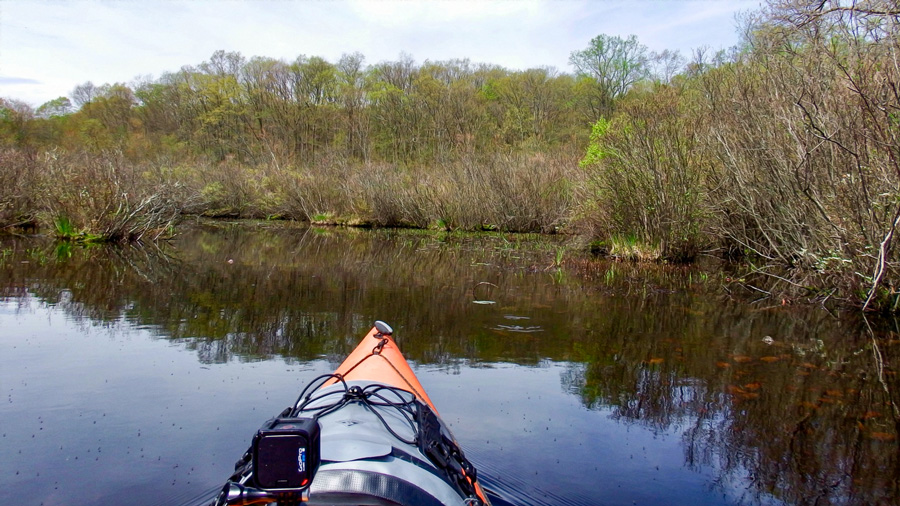
One of those wild places that I never get tired of exploring is Cranberry Lake in Byram. The impoundment was created in 1837 as a water supply for the Morris Canal which moved iron ore and other products to market from Phillipsburg to Jersey City. Cranberry Lake then became one of the most heavily developed lake communities in the early 1900s when it was turned into a resort destination that contained an amusement park. Many of the summer cottages on the northern half of the lake have since been turned into year-round residences, while the southern end remains less populated and undeveloped. Allamuchy Mountain State Park backs up to the lake’s southern shore where Cranberry Bog Run, at the very southern tip of the lake, is one of my favorite spots to explore.
I drive my orange Honda Element (I call it the Tangerine Dream) up to the boat launch. The launch is made up of paver block that slopes to the water with a floating dock that extends out onto the lake. I unlash the straps that secure my kayak, a 15.5-foot Mango colored Wilderness Systems Tsunami, and lift it off the car top and place it at the top of the slope to the water. I unpack my gear—a deck bag, paddle, cockpit half-skirt and dry bag—from the back of the Tangerine Dream and place it next to my boat. I park the car and return to my boat and ready it for the adventure ahead of me. I secure my deck bag which houses my camera gear—two GoPros, a bridge camera, and a DSLR—on my bow. I started paddling with camera equipment nine years ago after I had an encounter with a bear while kayaking on the Musconetcong River. I did not want to miss another opportunity like that again. I place the gear I don’t want to get wet in my dry bag and stow it in my deck hatch. With my gear stowed and my kayak ready I slide it into the water and step into the cockpit and sit. I take the first few strokes and quickly move myself away from the launch. I soon slip into the meditative rhythm of my double-bladed paddle as it alternatively enters the water. The sound of each blade as it enters and then leaves the water becomes my mantra as I cross the open lake.
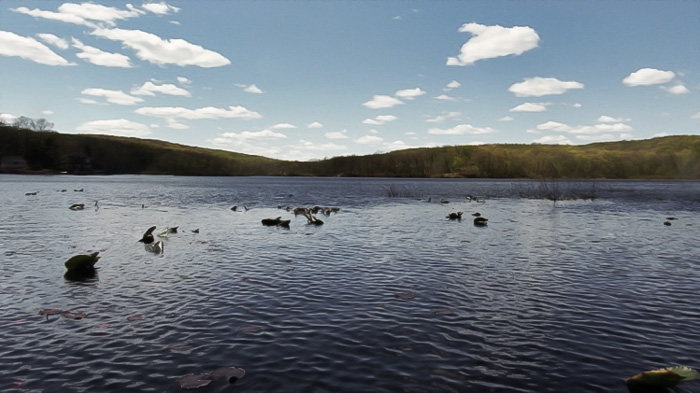
There are two rock islands that separate the northern and southern sections of the lake. When I reach these landmarks, I know I am getting closer to the quiet wildness that I seek. The waters become quite shallow and there are a few markers to guide motorboats through the deeper channels. Being in my kayak I have the ability to get close to the islands and take a good look at them. I observe wild columbine growing from the rocky surface. I am amazed at how the tiny flower clings to such an isolated environment in the middle of a lake. Paddling past the second island I notice at the base there is a very small hollowed-out hole at water level. In my mind it is a mysterious cave And I wonder what could be inside. Perhaps a pirate’s treasure or an ancient beast? More likely the hole is a remnant from all the mining done in the area back in the late 1800s. I leave the cave behind and paddle past Strawberry Point, another landmark on the lake. From there I can see across the open water in front of me to the southern end. It is void of any development except for a few houses that end abruptly and make way for the tree’s and rocky shore.
Each stroke of my paddle moves me along the calm waters as I glide silently past a group of small floating islands made up of water plants such as bulrush, cattails, and other wetland vegetation that anchor the mass to the shallow bottom. These masses teem with various wildlife. Painted turtles sun themselves on the grassy base. Red winged blackbirds dart back and forth, the males flash of red and yellow against their black wings shining brilliantly against the blue cloudless sky. Grackles with their iridescent feathers flash in the sun as they fly between the stands of shrubbery. I even spot a green heron working the base of the little island on the hunt for a meal. I understand and realize how lucky I am every time I encounter and observe wildlife while on my adventures
Paddling past the last of the houses I enter the undeveloped section of the lake. I pause and take a deep breath in and exhale as the silence of the wild and open space of Cranberry Lake consumes me. I take a few strokes with my paddle as the bow of my kayak slices through the water. A fish breaks the surface and I watch the ripples it leaves behind as takes cover. I pass two rock islands where sparrows and other small songbirds dart back and forth, landing in the shrubs and trees while an array of calls fills my ears. Off in the distance I can also hear the gurgle of a small feeder stream emptying into the lake.
I follow the sound to its source, a small sliver of water flowing down the rocky embankment and into the lake. I turn my kayak until the bow is facing the stream and I am looking at the woods in front of me. As I sit there, completely in the moment, watching the wildness around me, I am struck by the loud knocking of a woodpecker in the forest. I turn my ear toward the trees to get a better read on its possible location. I scan the trees to see if I notice any movement- maybe the flash of beating wings or a jack-hammering plume of crown feathers. As I continue surveying the woods, I spot the red crest feathers of a pileated woodpecker working the trunk of a tree. I am thrilled to have this encounter with this elusive bird, the largest woodpecker species we have in the area, standing at between sixteen and nineteen inches tall. The male will have a red malar stripe, or mustache, coming off his beak and his red crest will extend all the way down to the base of his beak. The female is missing the mustache and her crest stops at her forehead.
My kayak slips across the flat waters effortlessly into the back waters of the lake. As summer progresses, this section of the lake chokes with lily pads and becomes almost impossible to navigate. But even then, I do enjoy the challenge of pulling my way through the thick vegetation to sit among the white lily flowers and purple pickerel weed and watch the activity on the surface. During these warmer months the air is filled with the buzzing of bees and hum of various types of dragonflies. The surface can appear to be moving from all of the bugs living on the foliage. There is a plethora of wildlife to observe just on the surface of a lily pad filled body of water during the summer months.
The shore is untouched and probably the closest I can come to experiencing what the area might have been like hundreds of years ago. For a little while I can imagine the scene as one that a native Lenape might have witnessed before the invasion of white settlers. There are pockets of relatively untouched wilderness and open space all around us where we can get a glimpse of the past before industrial development took hold.
I stop paddling and just float on the water’s surface, completely absorbed in my surroundings. A cool breeze, so soft I can barely feel it, passes over the water creating little ripples that lap at my hull. I hear the rustling of leaves on the bank not far from my boat and strain my eyes to spot the big puffy grey tail of a squirrel who bounds deeper into the woods in search of nuts perhaps buried last fall. I recently learned that a squirrel will bury, on average, ten thousand nuts in the fall and is able to later recall the location of four thousands of those nuts!
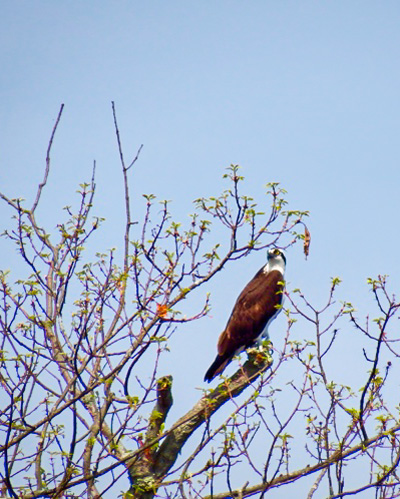
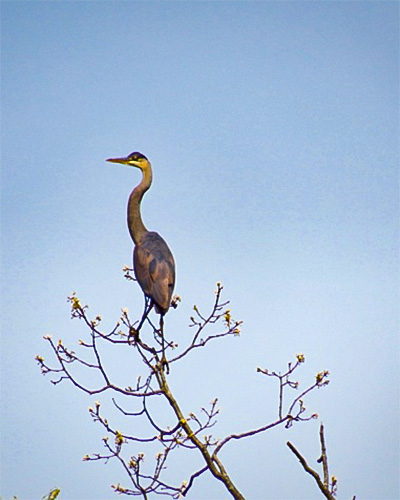
I continue my journey toward Cranberry Bog Run, passing another large rock island with many trees. A thick layer of brownish green algae clings to my hull. A bullfrog lets out a chorus of deep croaks as fish break the surface all around me. The sounds of nature overtake the buzz and hum of modern-day life around the lake. An osprey calls out with its distinctive whistle from high in a tree as it scans the waters below for its next meal. A great blue heron flies overhead. The huge bird lets out its familiar loud craggy CAW and lands atop a bare tree on an island in front of me. I watch as its tall body balances on the thin top branches. I am able to observe both of these amazing birds from about fifty yards away in complete silence without disturbing them.
I scan to a bare tree on the opposite shore where a patch of white movement catches my eye. Immediately I identify it as a bald eagle, and then I spot a second eagle fly in and land on the same tree branch. There is a great deal of posturing and chatter, then they both take off and climb together into the sky in front of me, beginning an amazing areal display that until now I had only seen in videos and pictures. After circling around the end of the lake they begin to dive, and soon talons lock as they begin spiraling down toward the water. At the last possible second, they release, and both fly off over the tree line. This sky dance is the eagles’ courtship display. Once again, I am humbled and honored to have witnessed such a show of grace and power in the wild.
As I watch the eagles disappear, I hear rustling in the leaves and bushes behind me and turn just in time to catch a glimpse of the broad side of a deer emerge from the woods. Standing at the water’s edge It spots me and my kayak in the water and with a flick of its tail bounds back into the woods and disappears.
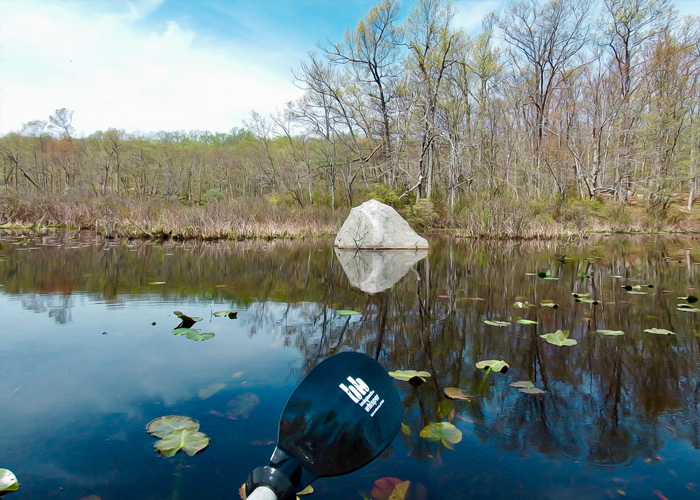
I continue south past a triangle-shaped rock that records the lake's history by the water marks along its surface. can be seen in the lines of past water levels. This rock, which I call Pyramid Rock, marks the gateway to Cranberry Bog Run.
I aim my kayak for the beaver channel that drops to about three feet deep, splits the waterway and carves a clear path back to the bog. On either side of the channel the water is only a few inches deep, and I’m able to travel far back into the bog until the deeper water gives way to the bog thickets. The bog seems to swallow the lake’s open water, giving rise to many types of aquatic shrubs and plants that create narrow passages where I’ve encountered large snapping turtles and various ducks. Navigation can be pretty tricky with my 15.5-foot kayak, and I realize just how special having such a place to explore is. I know that when I leave, I will be ready for anything that comes my way. Every time I explore the water it is an adventure. I never know what I will experience but I do know I will have an adventure that I will remember forever. Paddle On!
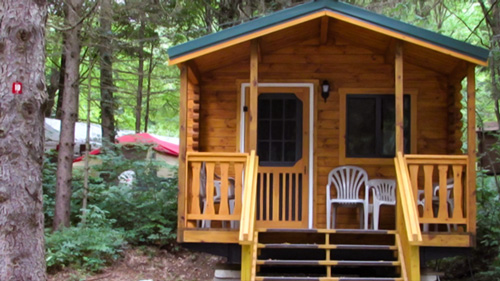
Located in Sussex County near the Kittatinny Mountains the camping resort offers park model, cabin and luxury tent rentals as well as trailer or tent campsites with water, electric and cable TV hookups on 200 scenic acres.
Follow the tiny but mighty Wallkill River on its 88.3-mile journey north through eastern Sussex County into New York State.
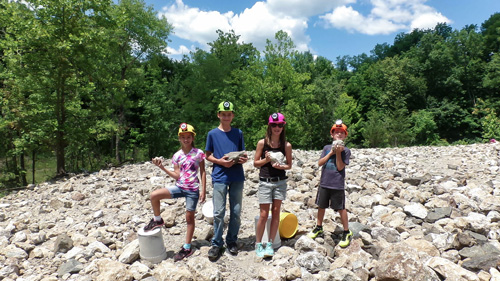
“The Fluorescent Mineral Capitol of the World" Fluorescent, local & worldwide minerals, fossils, artifacts, two-level mine replica.
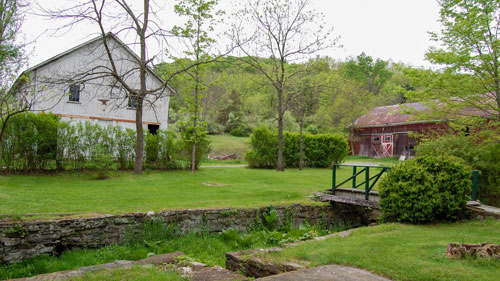
Peters Valley shares the experience of the American Craft Movement with interactive learning through a series of workshops. A shop and gallery showcases the contemporary craft of residents and other talented artists at the Crafts Center... ceramics, glass, jewelry, wood and more in a beautiful natural setting. Open year round.